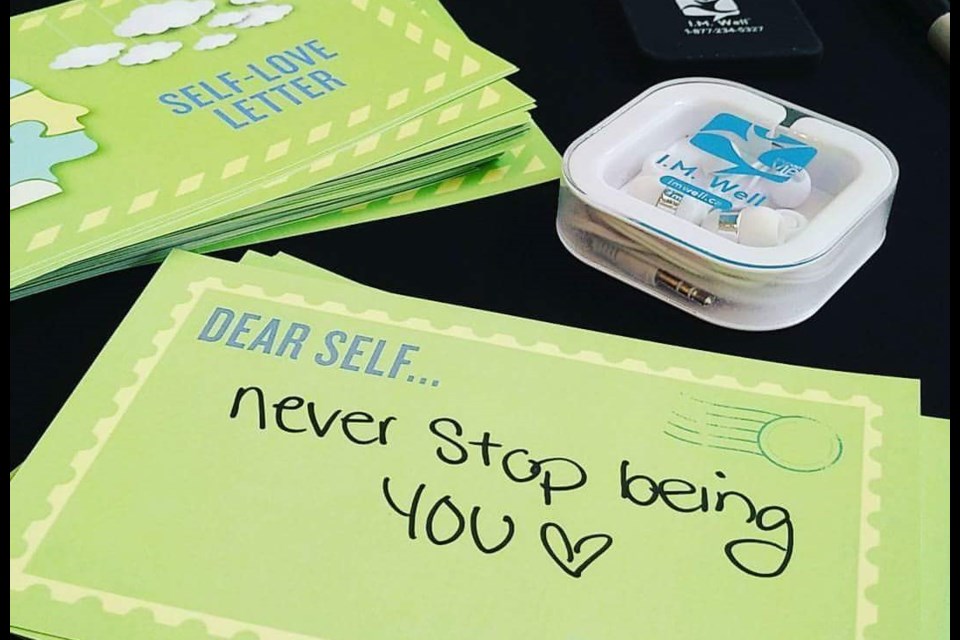Today is Bell Let’s Talk Day, the annual 24 hours set aside to encourage people to talk about mental health issues and challenges.
It’s a day of revelations and heartbreak, of courage and conviction. It’s a day of tears and laughter, of relief and regret. It’s a day when the door is open – just a crack – to let others see the heartache that haunts and feel the pain of depression and anxiety and panic attacks. It’s a day when people open up about suicide and cutting and talk about how everything fell apart and about, hopefully, picking up the pieces.
The day is something different for each person, says Kevin Gangloff, the director of youth opportunities and driving force behind the Orillia Youth Centre. “From a big picture perspective, it’s really started to break down the barriers and raise awareness around mental health and the message around ‘let’s talk about it’,” said Gangloff. “The reality is it’s opened up a lot of avenues.”
Gangloff said the message of this day is the mantra at the youth centre – every day. “That’s why we’re always running groups and looking for opportunities for staff to talk to youth,” he told OrilliaMatters. “We do see a wide array of those mental health issues coming through our doors. Youths are really struggling and talking about it is so important; it’s that first step to understanding. We hear everything from talk of suicide to self harming and everything in between: those suffering from abuse, those who are bullying or being bullied. We try to get them to talk about it.”
To help foster communication, the centre provides regular programs, is working on an art project and has recently partnered with the Lakehead University Mental Health Outreach Team (MHOT). “They were here the other night and they set up a circle and kids were talking about mental health,” said Gangloff, who noted such an event would not have happened a decade ago. “To hear those conversations in that environment is tremendous. People are willing to share now. Bell Let’s Talk has knocked down that stigma so that it’s alright to talk about struggle, to say you’re not feeling well … it’s done quite a service for people who really struggled in the dark for so long.”
Theresa VandeBurgt says she has had many dark days. She was in high school when Bell Let’s Talk began in 2011. “I remember at the time being really overwhelmed when people started to talk about it online because it was something I struggled with myself. It really encouraged me that I wasn’t alone and that it’s OK to talk about.”
She sees the day as a “stepping stone” to better mental health, to reaching out, to finding help. “To me, its really good for people to realize that they can talk about it.”
VandeBurgt said the awareness campaign, at least in part, inspired her to step up to help others and to make sure the conversation continues. It’s why, in 2016, she spearheaded the formation of the MHOT at the Orillia campus of Lakehead. She said their top priority is peer support “and opening up awareness about resources on campus and in the community.”
The group has tried to have a visible presence on campus. The fourth-year media studies student said they work hard to “create general awareness and on ending the stigma around mental health.” To that end, the MHOT has organized an annual Mental Health Outreach Week on campus. It includes special seminars, presentations from experts and survivors and other activities.
“This year, we had a student-led panel experience on campus about mental health and how students are coping. It was an open discussion,” she said.
The group is also organizing a Rock the Blues Away event Feb. 8 that will include music, poetry and opportunities to share and learn. “We are working in partnership with the wellness centre on campus and during the day (Feb. 8) 60 high school students will be coming for our Youth Mental Health Summit. We want to help students learn how to cope with their own mental health in their community.”
But the irony is that while awareness has grown exponentially, mental health services have not, generally, kept up.
“One struggle we’re still facing, especially in Orillia where we’re a small community, is that we do have some really good resources (Canadian Mental Health Association, walk-in counselling, services here on our campus) but I think it is something that still needs to grow. There’s a lot more work to be done.”
Gangloff agrees.
“At the end of the day, we need to be offering more opportunities for youth to get in front of that professional,” he said. “Hopefully, Bell Let’s Talk helps to mobilize more resources. It’s great to see awareness, but we need those decision-makers to see that and to be moved to action.”
He said it’s “unacceptable for someone to wait four or five months to see a counsellor. We need more resources in our community. When youth are ready to have that talk, if they don’t have the outlet, that could be the end of it,” he said. “If they feel the courage to speak up and talk and if the person on the other side of table isn’t there, we’ve done a disservice … we can do better.”
Bell Let’s Talk Day has raised $86.5 million for mental health initiatives since 2011. Bell says more than 492,000 children and youth have been reached and more than 212,000 individuals have been supported through Bell Let’s talk programs.
If you want to participate, it’s easy. Use the hashtag #bellletstalk and Bell will contribute 5¢ for every applicable text, call, tweet, social media video view and use of their Facebook frame or Snapchat filter. The money goes towards mental health initiatives in Canada.
